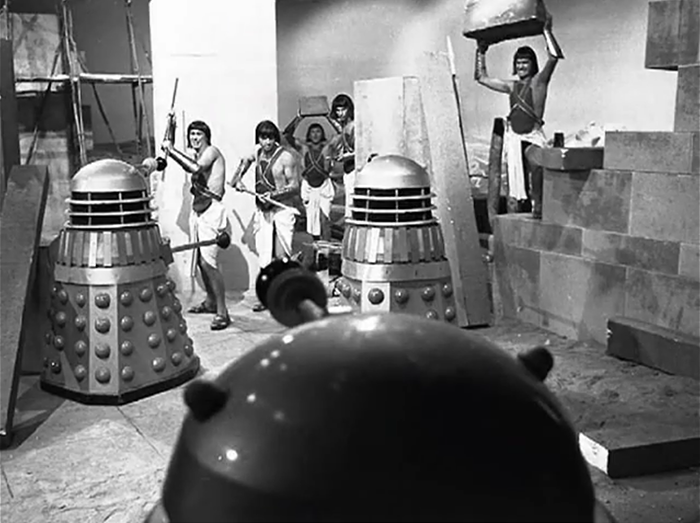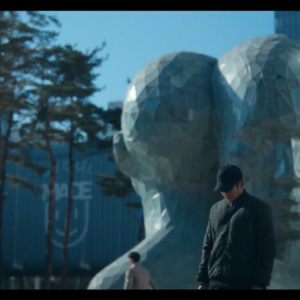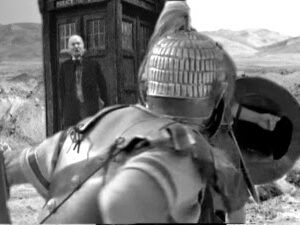The adaptation’s treatment of Cheery is emblematic of the show’s problems

Like a lot of lifelong Pratchett fans, I gave myself a good talking to before I sat down to watch BBC America’s new series, The Watch. This series was touted as being ‘inspired by’ (rather than adapted from) the Discworld novels, including Guards! Guards!, Men At Arms, and Night Watch (among many others) that followed the adventures of Samuel Vimes and his rag tag band of officers on the Night Watch in the city of Ankh-Morpork.
Self, I told myself. Adapting Discworld novels into live action is hard. Look at the previous attempts in all their flawed glory (although I do rather love Hogfather and watch it religiously at Christmas every year – no pun intended).
I was prepared therefore to step into The Watch with determination to just take it as it comes. To accept it for what it was trying to be. You want to turn this into a steampunk/cyberpunk dystopian crime noir episodic television adaptation then all the best. I’ll step on in and see how I feel.
I don’t mind if it’s not a faithful adaptation. I don’t need a step-by-step retelling of Guards! Guards! I get that this is a television show, I get the budget constraints, I get that the times have moved on and there are things that modern writers want to say about the world that Pratchett wasn’t around to see. I understand all of that. If I want a blow-by-blow straight-from-my-imagination version of Guards! Guards! then I’ll just re-read the book.
Despite my best efforts to stay impartial, it’s probably not a surprise that I’m going to say this: The Watch got it wrong. Very wrong. And I could sit here and outline all the ways in which it got it wrong. But instead this post is going to focus on the character of Cheery and why the production’s approach to our female dwarf forensic scientist embodies the broader problems of the show. Because the way in which they got Cheery wrong is the way in which they got everything else wrong, even if those things manifested in different specific ways.
Inspiration can’t be thoughtless
The Screen Rant has done an excellent job of canvassing how The Watch came about and exactly why and how the writers and producers decided on an ‘inspiration’ based show rather than an adaptation. Pratchett’s estate has distanced itself from the production for a reason and everyone involved made it clear that this was inspired by rather than adapted from.
The problem with the concept of being inspired by something is that you can change the letter of it but still need to embody its spirit. There’s nothing that says that Vetinari can’t be a woman and nothing that says that Lady Sybil Ramkin can’t be black and on paper both are wonderful concepts. But if you take your plus-sized middle-aged love interest and turn her into a nubile warrior half the male lead’s age then weirdly people aren’t going to praise you for your groundbreaking colour blind casting.
This version of The Watch is not just different, it’s thoughtlessly different. And that’s a crime not just against Discworld and its fans but against the dictates of storytelling itself. The Watch hasn’t so much been inspired by the Pratchett novels as it has done a drive-by mugging on them: grabbing a hodge-podge of elements it doesn’t know how to use and applying them randomly with no consideration as to their purpose or meaning. The Watch isn’t just a bad adaptation as a result, it’s bad television as a result. And that’s the reason fans are so up in arms about it.

First a detour through Ankh Morpork
Pratchett’s greatest gift to the world was a living, breathing, three-dimensional universe whereby characters you loved in one book regularly popped up in another. Even books that were not about the Night Watch had the Night Watch in them. Pratchett had a meticulous eye for detail and a sprawling, brilliantly-realised and evolving fantasy world. And while the twin city of Ankh and Morpork was not the only one on the Discworld, it was the one that most lived and breathed as a character in and of itself.
The city is the main character in noir. The Night Watch novels, more than any others in the Discworld anthology, had noir elements to them. But, because it was Pratchett, it also subverted film noir at every turn. And that’s the secret perhaps to reading and adapting Pratchett. Be something but also subvert it. Embody something but quietly nudge your reader to ask questions about that thing. This is far far more difficult than it appears. But it’s an important point when the show seems to be trying to be Pratchett while also subverting Pratchett. And under the circumstances, that’s a recursion too far.
Sex, gender and dwarves
There’s no men and women in the watch, just a bunch of lads
Angua to Cheery, Feet of Clay
Cheery Littlebottom is a dwarf alchemist introduced in the Discworld novel, Feet of Clay. A hard working, dedicated and brilliant scientist, Cheery is also something else: she’s a female dwarf. And in Discworld, dwarves are all male (even when they’re not). Sex and gender are something dwarves discover about each other by obscure cultural machinations not apparent to the outside world. Dwarves are dwarves: whether you’re male or female is just not something you talk about in polite company.
In the books, Cheery is a woman in a body outwardly identical to every other dwarf. Her beard and height mask her sex better than any chainmail and yet she is struggling for a way to assert a gender identity in a culture that has no language for it. More importantly, it’s not just that Cheery wants to express outwardly her femininity. She doesn’t just want to be recognisably female: she wants to be a female dwarf.
In a way, Pratchett said, as with the dwarves so the Watch, as with the Watch so the workplace in real life. Especially the kind of blokey ones that I personally grew up around. It’s fine for you to be a woman in them just so long as your femaleness isn’t noticeable. And while Cheery – and Pratchett – might have chosen to represent femininity in more traditional ways, it wasn’t about either make-up or dresses. It was about the freedom to be different and to express yourself in society and to still be respected for who you are and what you had to offer. It was about the freedom to be yourself.
For an interesting contrast, Cheery and Carrot were coming at the same problem from a different angle. Carrot wanted to be seen as a dwarf despite being a 6 foot 5 human. Cheery wanted to be seen as a woman despite being a dwarf. As two sides of the same conundrum, their characters worked best in opposition to each other. Cheery accepted that Carrot was a dwarf. Carrot accepted that Cheery was a woman. Both were accepted and respected as officers of the Watch. Something profound is said about diversity.
Let’s be clear up front about my position here – no gender flipping or colour blind casting is necessary to make this point. Carrot and Cheery’s relationship with each other, with the Watch, with the wider dwarf community, and with the world at large already conveys the message that anybody dealing with trans issues or race issues is trying to make.
When The Watch introduced us to the character of Cheery, I thought, “Okay, Cheery’s a transgender human woman. I can deal with that. Don’t know why they went with it but if they don’t want to deal with the dwarf issue on their budget then I guess I can understand that. It’s a shame that we won’t get the natural conflict set up between her and Carrot though. But if they’ve decided to explore the issue of identity and cultural gender constructs through a trans woman rather than a female dwarf then I can respect that”.

But, here’s the thing, Cheery is apparently still supposed to be a dwarf. And this is where the whole thing becomes head-scratchingly nonsensical. Cheery not only looks nothing like a dwarf, but Jo Eaton-Kent (wonderful actor though they are) is very tall. They make no attempt to make them look like a dwarf either; as though looking like an archetypal dwarf but wanting to not be an archetypal dwarf wasn’t the entire point of Cheery’s character. Because it was. And while this casting would work with a character who was a transgender human woman, that’s not who Cheery is and it’s not where her identity issues lie. The fact that Cheery is short with a beard is not just a meaningless externality. It’s the point.
Women have beards, dwarves can be tall
As well as Cheery, we also meet Carrot Ironfoundersson, the human orphan taken in and raised by dwarves. Carrot, we’re told in the first episode, had to leave the dwarves because he is too tall. Here is the crutch of his character and his conflict. He is a dwarf who can’t live as a dwarf for reasons that he cannot change. He is hamstrung by his biology, trapped in a body that doesn’t conform to his perception of himself. How Carrot reconciles his dwarfishness with the reality of his own humanity is a profound struggle he is undergoing as he carves out a new life and new identity for himself in Ankh-Morpork. So what does that mean when he’s confronted on his first day by a dwarf that’s not only the same size as him but looks nothing like a dwarf at all?
As for Cheery, what does it mean for her to be trying to be both female and dwarf when the Cheery we see on screen looks nothing like a dwarf at all? (Whoops, I already said that. But it’s important!). In the books, Cheery has to find a way to express her femaleness, to find a kind of new dwarf femininity, to construct her own version of herself. Yes she wants to wear make up but she also wants to keep her beard. More importantly, she has to go through this process around a dwarf like Carrot who is a rabid traditionalist for reasons that have to do with his own struggle with his identity. So what does that mean when Cheery is confronted by a Carrot that doesn’t seem to care if she’s female or even to see the concept of female dwarves as problematic?
For me as a viewer, it renders those struggles meaningless. What does it mean to say that Carrot is a dwarf and Cheery is a woman if Cheery looks like Carrot and Carrot doesn’t care? What makes this band of misfits a band of misfits if the reasons they don’t fit in are reduced to a single expositional line and then rendered unimportant?
And what does it mean when a production casts a non-binary actor as a gesture of gender-blind casting and puts that actor into a character whose struggles with their identity have been rendered meaningless?
It means nothing.
Which means – extended out across all the show’s decisions – the show means nothing.
And this – this thoughtlessness – is why Discworld fans are so angry about this adaptation. And that is something that no amount of quippy banter or lightweight, third rate dystopian cyberpunk is going to fix.
The Watch is an empty vessel. And that’s the biggest betrayal of Pratchett’s legacy of all.
EDIT: This piece has been slightly edited since it was first published to make it clearer that I was not saying that Cheery was a transgender woman. Only that Cheery’s journey to expressing her femaleness in a culture that was resistant to it could have been represented by a trans woman if the writers chose.




I was hoping to check this drama out as an introduction for the discworld series but I’m so glad I read your post first! Thank you, I’ll start reading the books 🙂
It is frustrating and disappointing because we know it could be so much better, if they took the time to think about the story they want to tell us. I’m noticing this trend more and more in Hollywood, where it seems like the casting team are just ticking off boxes, cast a non binary actor, cast non-white actors etc The viewers should be satisfied with this, right? They couldn’t be more wrong, they don’t take the time to adapt the storyline. I just can’t wait for a cleverly written show that just happens to have a diverse cast, oh and it would be even better if it was a sci fi show, not about the struggles of being black etc..
I also feel the same way about shows like BlackAF and MixedIsh and GrownIsh and the other ish shows. It’s great they are successful but who is this show for?
I would just like to watch a show that has characters of various nationalities and or are non binary, just existing!
I’ll definitely visit this blog again, thank you 🙂
You’re welcome, and thank you!
What “The Watch” adaptation?! It never happened, lalalala.
Not in my world, honestly.
All other sh*t happened, but not this.